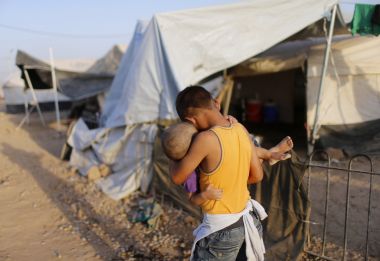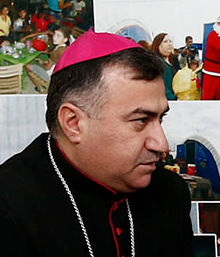Islamic State could end Middle Eastern Christianity, Archbishop warns Synod

An Iraqi Archbishop today warned that Christianity is at risk of extinction in the Middle East, both "as a religion and as a culture".
Speaking before the Church of England's General Synod in London, the Chaldean Archbishop of Erbil, Bashar Warda, said that the growing crisis in Iraq and Syria is one of "chronic urgent need".
The Archbishop was introduced by the Archbishop of Canterbury, Justin Welby, who said it was a "huge privilege to hear from someone who speaks from the centre of the suffering Church".
Archbishop Warda's address and the experience of Middle Eastern Christians is of "immense importance and significance to us," Welby added.
"For the Chaldean Church, and our sister churches in the East, the persecution our community is enduring is doubly painful and severe," Archbishop Warda said in his opening remarks.

"We are personally affected by the need and by the reality that our vibrant Church life is dissolving in front of our eyes. The massive immigration that is now occurring is leaving my Church and other Churches much weaker. This is a deeply sorrowful reality."
The Iraqi Archbishop said that more than 125,000 Christians have been forced to flee from their homes over the past year after being threatened with a 'convert or die' edict by Islamic State militants. Reports of Christian homes being looted and destroyed have emerged, and many churches and other places of worship have also been desecrated.
"We are waiting to know that our villages are safe and secure," the Archbishop said. "We believe the dear Lord will allow us to see that day; and on that day we will return to deserted and ruined houses, empty schools and hospitals. As for our precious churches, it is heartbreaking for us to imagine what they will look like when we return. But we can...rebuild."
Archbishop Warda said the current situation is "one of [the] worst and hardest stages" in the history of Christianity. Believers in the Middle East have experienced a number of "upheavals" in the wake of World War II, he added, including a number of massacres and "acts of genocide".
"They were crowned by the Massacre of the Church of Our Lady of Salvation in Baghdad in 2010 during which the Christian worshippers were killed in cold blood," he said.
"This was followed by acts of terrorism and displacement in June and August 2014 that witnessed the worst acts of genocide experienced by us in our homeland. We are now facing the extinction of Christianity as a religion and as a culture from Mesopotamia."
The Archbishop added that he and many of his fellow clergymen are often tempted to ask Christians not to flee, to "keep the presence of Christ alive in this special land". But "the Church is unable to offer and guarantee the fundamental security that its members need to thrive."
He therefore called upon the international Church to increase its prayer for those being persecuted at the hands of Islamic State, and to raise awareness of their plight.
"I cannot repeat loudly enough that our well-being, as a historic community, is no longer in our hands," he said.
"The future will come, one way or another, and for us this means waiting to see what sort of aid arrives."
Following Archbishop Warsa's address, Rev Dr Chris Sugden, a clergy member for the Diocese of Oxford, called on the Church of England to issue an apology to Christians in Iraq "for failing to support them adequately in their hour of need".
"In the body of Christ, when one member suffers, all member suffer," he continued, adding that he believes the Church to have failed its fellow believers. He also criticised the UK government for failing to offer "meaningful asylum" to those who have fled the Middle East.
"I trust that our Church though what channels it can ... will seek to provide some meaningful help for persecuted Iraqi Christians, even at this late stage," Sugden finished.
Yesterday, Archbishop Warda told UK peers and MPs that Christians in the Middle East do not "have much time left" and urged greater military action to combat the threat of ISIS.
"As a Catholic I find it hard to say, but I want military action, there is no other way now," he said.
"What we are seeing is worse for the world than what happened in Afghanistan, with more and more young people going to fight with Daesh [Islamic State]. Military action is needed – powerful force – to get them out of our villages."











